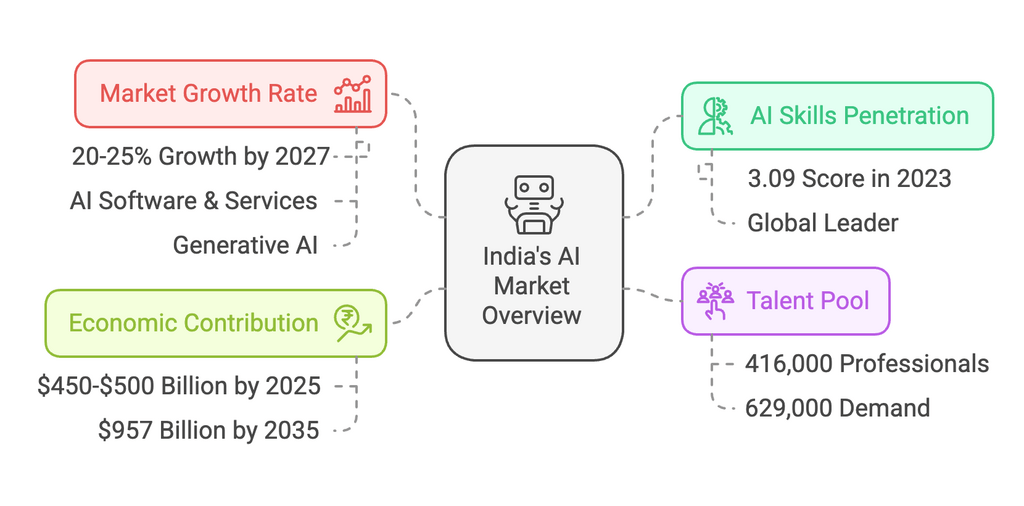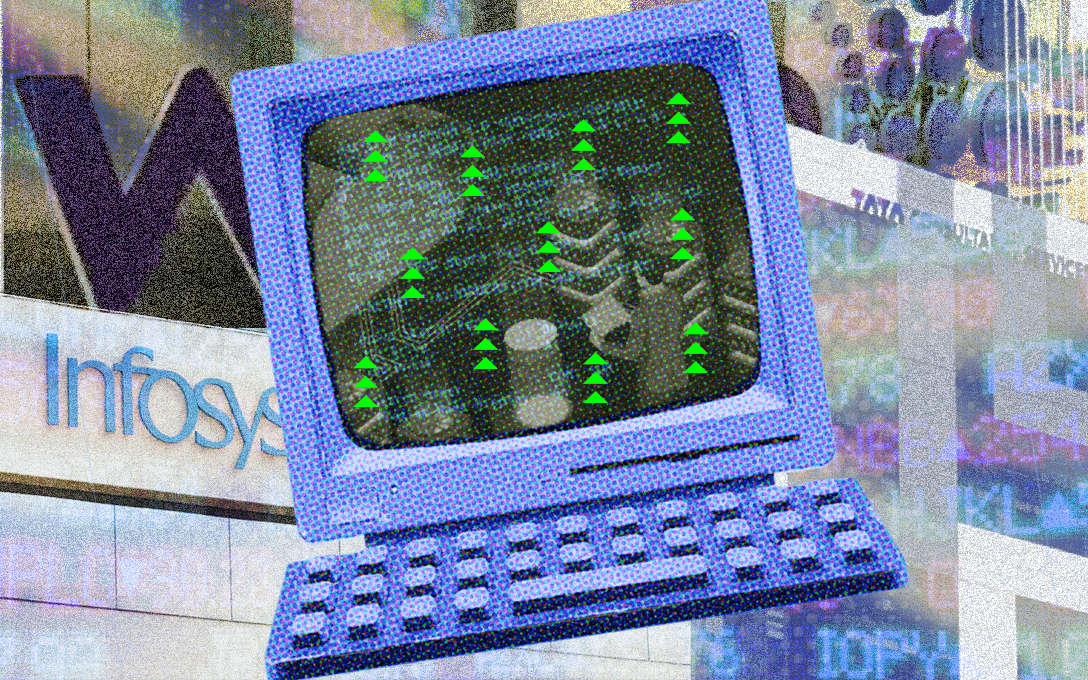Microsoft’s $3-bn Bet: How Big Tech is Racing to Tap India’s AI boom

Computer scientist John McCarthy coined the term “artificial intelligence” in 1955, proposing that “every aspect of learning … can in principle be so precisely described that a machine can be made to simulate it.”
And he was not wrong.
Picture this: A small Indian village where farmers use AI-powered apps to predict weather patterns and optimise crop yields, or a bustling metro city where an AI chatbot helps millions navigate government services in regional languages. These aren’t scenes from a sci-fi movie but glimpses of India’s rapidly evolving AI landscape.
Global tech giants are taking note and making big bets on this promising market. From the recent Microsoft $3-billion AI bet (its biggest ever) to Google’s ambitious $10 billion investments until 2027, the race to tap into India’s AI boom is on, and the stakes couldn’t be higher.
India’s AI Adoption
India’s AI ecosystem has witnessed significant growth over the past decade. According to Nasscom, data analytics and Al could add $450-$500 billion to India’s GDP by the end of 2025, representing approximately 10% of the $5 trillion economy.
The report estimates the sector’s growth rate to be about 20-25% by 2027, with the lion’s share coming from AI software and services, and Generative AI. Further, the government has proposed that AI will contribute an additional $957 billion to India’s economy by 2035.

There’s More…
LinkedIn’s 2024 Workforce Report ranks India as one of the top countries for AI talent globally. It states that 92% of knowledge workers in India use AI, compared to the global figure of 75%.
A study by Rackspace Technology found that over 70% of Indian businesses are integrating AI into their operations, focusing on enhancing efficiency and customer experience.
In another interesting IBM survey conducted in 2023, 59% of large Indian enterprises have actively deployed AI, the highest percentage among the 20 countries surveyed, including the US, UK, and Japan.
This confidence in AI adoption is further bolstered by Microsoft’s ambitious plans to train 10 million Indians in AI by 2030, a move that could solidify India’s position as a global leader in AI expertise and innovation.
Making India AI-first
Apart from Microsoft, other global tech giants have made equally ambitious investments in the past five years for India’s AI future:
Amazon Web Services (AWS): AWS plans to invest $13 billion by 2030 to expand its cloud infrastructure in India, aiming to cater to the growing demand for AI-powered solutions.
Google: In 2020, Google announced plans to invest $10 billion in India over the next five to seven years to accelerate the adoption of digital services in the key overseas market.
NVIDIA: In October 2024, NVIDIA deepened its collaboration with major Indian firms, including Reliance Industries, and introduced a lightweight AI model for the Hindi language, targeting the expanding market in India. NVIDIA has committed to significantly increasing its computing infrastructure in India and is collaborating with IT firms to train half a million developers.
Meta Platforms: In 2020, Facebook invested $5.7 billion for a 9.99% stake in Jio Platforms, recognising the potential of India’s digital economy.
Intel and Qualcomm: Both chip-making companies have invested in Jio Platforms, contributing to developing India’s digital infrastructure.
Key Drivers
Statista highlights that India’s AI talent concentration has also shown the most growth till 2023, having increased by 263% since 2016.
Several factors are fueling this rise:
Demographic Advantage: With a young, tech-savvy population, India has the human capital to drive AI adoption and innovation. Initiatives to upskill workers in AI and cloud technologies are adding to the momentum.
Government Support: Policies like Digital India, Make in India, and semiconductor incentives worth $10 billion underscore the government’s commitment to building a robust digital ecosystem. The government also approved an allocation of over ₹10,000 crore to the India AI Mission, which seeks to ‘bolster India’s global leadership in AI’.
Private Sector Investment: And, of course, partnerships between Indian firms and global tech giants are fostering innovation and creating new growth opportunities.
Sectors Benefiting from AI
The influx of AI investments is transforming multiple sectors in India. Here’s more:
Healthcare: AI is being used for diagnostics, telemedicine, and personalised care, improving access to quality healthcare in underserved regions.
IT and Cloud Services: Companies like Infosys, TCS, and Wipro are at the forefront of integrating AI into their services.
E-Commerce and Retail: AI-powered analytics and customer insights are enabling FMCG and e-commerce firms to provide more personalised shopping experiences.
Manufacturing: AI-driven automation and supply chain optimisation are helping manufacturers increase efficiency and reduce costs.
Education Technology (EdTech): Ed-tech platforms are leveraging AI to personalise learning experiences and address the growing need for digital upskilling. Meanwhile, tools like Open AI’s ChatGPT are reshaping the learning landscape by enabling students to seek instant answers and insights.
Risks to Consider
While the opportunities are immense, investors should be mindful of potential risks:
Execution Challenges: Scaling AI initiatives across India’s diverse regions and bridging infrastructure gaps remain challenges.
High Implementation Costs: Due to budgetary constraints, small and medium enterprises (SMEs) find it challenging to adopt AI technologies. According to a Nasscom survey on tech-enabled MSMEs, 94% of tech MSMEs acknowledge AI’s ability to drive business growth, yet nearly 65% struggle with AI adoption due to limited awareness of available tools and resources.
Regulatory Uncertainty: Data privacy concerns and ethical considerations around AI must be addressed. However, with the introduction of the Personal Data Protection Bill 2019, the subsequent Digital Personal Data Protection Act 2023, and the National Cyber Security Strategy 2020, India is moving in the right direction to prevent data breaches.
Valuation Risks: Overvaluation in the tech and EdTech sectors could impact returns.
To Wrap Up…
India’s AI journey reflects its transformation from a service-oriented economy to a global tech innovator. The surge of investments from global tech giants underscores the country’s potential as a leading hub for AI innovation. As an investor, aligning portfolios with this transformation could be the key to unlocking long-term value.




